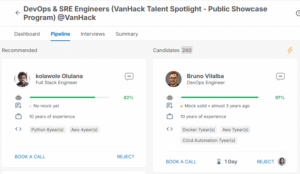Finding the right developer can make or break your startup, and having a great idea isn’t enough; you need developers who can bring ideas to life. But with thousands of candidates and platforms out there, how do you know who’s truly right for your team? Hiring developers involves technical needs, cultural fit and timing.
In this post, you’ll learn how to hire developers for your startup by understanding what you need for your project, why remote work models work for startups, how to overcome hiring challenges and how to find developers that match your goals. By the end, you’ll have a clear path to finding developers who don’t just code but help build your startup’s future.
Understanding the Type of Developer You Need
 Before beginning your search, clearly define the type of developer that best fits your project needs. The success of your product often hinges on hiring the right person for the role.
Before beginning your search, clearly define the type of developer that best fits your project needs. The success of your product often hinges on hiring the right person for the role.
Identify your project goals
Are you planning to launch a mobile app or build a web-based platform? App developers and web developers often work with different frameworks and programming environments, so understanding your end product is important.
Choose a specialization
Determine whether you need a front-end developer focused on user interfaces, a back-end engineer to handle databases and servers, or a full-stack developer who can manage both ends of the system.
Clarify your tech stack
Be specific about the technologies your project will rely on, whether it’s React, Node.js, or Python. Hiring developers already experienced in your chosen tools can reduce onboarding time and boost productivity.
Generalist or specialist?
For early-stage startups, a developer with broad, adaptable skills can handle various tasks across the stack, while later-stage companies may benefit more from a specialist with deep technical knowledge in one area.
Experience matters
Consider whether your project needs junior developers who bring fresh ideas at a lower cost, or senior developers who offer proven expertise and leadership in complex development tasks.
How to Find and Hire a Developer That Fits Your Vision
 You’re looking to hire a developer who is not just about the technical chops. You want someone who gets your mission and is eager to grow with your startup.
You’re looking to hire a developer who is not just about the technical chops. You want someone who gets your mission and is eager to grow with your startup.
- Start by exploring spaces where software professionals tend to gather, collaborate, or showcase personal side projects. It’s a great way to spot self-driven talent.
- To find skilled developers, engage in online discussions, join developer forums, or participate in virtual events focused on your startup’s tech stack or industry niche.
- Take time to review code samples, write-ups, or project case studies to identify experienced developers who can back up their skills with real-world problem-solving.
- Speak with startup peers, advisors, or community leaders, they often know exactly where to find the best developer for fast-paced environments like yours.
- Most importantly, look for individuals whose curiosity, communication style, and growth mindset align with the way you want your team to grow.
Why VanHack Stands Out as a Platform to Hire Developers
If you’re looking to hire developers who are ready to hit the ground running, VanHack is a trusted platform to look into. We connect startups with a diverse pool of pre-vetted developers from around the world, ideal for fast-paced, early-stage companies.
VanHack also specializes in matching remote developers with startup teams, with access to talent that’s already been assessed for both technical and communication skills. Whether you’re hiring a team of developers or searching for software engineers to fill skill gaps, VanHack makes the process seamless.
Many skilled developers on the platform thrive in agile, fast-moving environments and are ready to contribute meaningfully to your product vision. VanHack offers both speed and quality in one place.
Hiring Remote Developers for Your Startup
 Hiring remote software professionals offers unmatched flexibility, an essential advantage in the startup ecosystem.
Hiring remote software professionals offers unmatched flexibility, an essential advantage in the startup ecosystem.
- Cost-effective growth: Allows you to expand your development team without the overhead of full-time employees. You get access to skilled professionals without committing to long-term payroll expenses.
- Speedy delivery: Specializing in specific technologies, enabling faster turnaround times. Their niche expertise helps accelerate your product’s development and launch.
- On-demand flexibility: Only pay for what you need, when you need it. Remote developers provide adaptable support with no obligation for long-term contracts unless it aligns with your plans.
- Global perspectives: Tap into a diverse pool of talented developers worldwide. Different backgrounds bring fresh, innovative solutions that can give your startup a competitive edge.
- Low-risk evaluation: Remote arrangements let you assess a developer’s compatibility with your team and goals before committing to a deeper partnership or permanent hire.
Benefits of Hiring Remote Developers in a Startup
 In 2025, hiring remote developers for startups is a strategic move embraced by agile companies around the world. Here’s why:
In 2025, hiring remote developers for startups is a strategic move embraced by agile companies around the world. Here’s why:
- Lower operational costs: Save significantly by reducing expenses tied to physical office spaces, utilities, and in-house equipment. Remote setups free up budget that can be redirected toward growth and innovation.
- Access top software developers: Without geographic restrictions, you can hire the best talent regardless of location. This opens doors to experienced professionals who may not be available locally.
- Round-the-clock development: With team members spread across multiple time zones, your product can move forward continuously. This 24/7 workflow helps accelerate progress and meet tighter deadlines.
- Autonomy-driven workflows: Many developers thrive in asynchronous environments where they can work with fewer distractions. This often results in deeper focus, better code quality, and faster delivery.
- Expanded talent access: Going remote means tapping into a much broader pool of developers, giving your startup more options to find the right fit, whether you need niche skills or general expertise.
Challenges of Hiring Developers and How to Overcome Them
 Hiring a software developer isn’t always smooth sailing, especially in remote setups. Here’s how to navigate some of the most common hurdles:
Hiring a software developer isn’t always smooth sailing, especially in remote setups. Here’s how to navigate some of the most common hurdles:
- Skill validation: One of the biggest challenges when you hire remotely is knowing who’s truly capable. Use hands-on coding assessments and real-world tasks to vet developers effectively and ensure their skills align with your needs.
- Communication barriers: Working with global talent often brings language or cultural differences. Set clear expectations from the start, and rely on communication tools like Slack, Zoom, or Loom to keep everyone aligned and reduce misunderstandings.
- Time zone friction: Coordinating across multiple time zones can be frustrating. Use time zone overlap tools and shared calendars like Google Calendar to create a consistent, collaborative schedule that works for everyone.
- Maintaining accountability: Remote work doesn’t have to mean less structure. Set measurable goals, implement project management tools like Trello or Asana, and focus on outcomes rather than micromanaging every task.
- Technical documentation issues: Inconsistent documentation can slow progress and confuse new team members. Encourage developers to maintain clean, up-to-date documentation to ensure transparency and continuity.
How to Hire Software Developers Who Align With Your Startup Values
 When building your startup, hiring the best developers means looking beyond technical ability, it’s about finding people who genuinely align with your mission and culture.
When building your startup, hiring the best developers means looking beyond technical ability, it’s about finding people who genuinely align with your mission and culture.
Value-driven interviews
Don’t just assess coding skills. Use behavioural questions to explore whether the developer shares your vision and can contribute meaningfully to your startup’s goals.
Startup experience counts
Developers with previous startup experience understand the fast-paced, ever-changing nature of lean environments. They know how to pivot quickly and handle challenges with limited resources.
Shared mission
The ideal developer for a startup should be excited about your product and passionate about the problem you’re solving. Genuine enthusiasm can drive deeper engagement and commitment.
Soft skills matter
Technical talent is important, but collaboration, adaptability, and strong communication are essential for thriving in a startup setting where teamwork is key.
Growth mindset
Look for developers who are eager to grow alongside your company—those who see beyond the current project and are invested in long-term success.
Tips to Successfully Hire a Developer
 Even a highly qualified developer can struggle without the right setup. To get the most from your hire, create a solid framework that sets everyone up for success.
Even a highly qualified developer can struggle without the right setup. To get the most from your hire, create a solid framework that sets everyone up for success.
- Clear project briefs: Clearly outline the scope, goals, and expected outcomes. Defining timelines, milestones, and deliverables upfront helps avoid confusion and keeps the work on track.
- Fair compensation: Competitive rates attract top developers, but more importantly, clarity around payment structure and deliverables builds trust and commitment.
- Trial periods: Before diving into long-term work, offer short-term contracts or paid test tasks. It’s a smart way to evaluate technical fit, communication style, and working rhythm.
- Strong communication: Agree on tools (like Slack, Zoom, or Notion), communication cadence, and feedback loops early on. This ensures smooth collaboration from day one.
- Track progress: Use project management tools like Trello or Jira to stay organized and ensure developers create consistently and transparently. Regular updates build accountability without the need to micromanage.
Final Thoughts
Whether you want to hire a developer for a one-time MVP or build a long-term development team, there’s never been a better time to explore global talent. Developers from around the world now work across boundaries, across time zones, and across technologies to support startups just like yours.
With a clear roadmap, the right platforms, and a values-first mindset, you’re ready to hire the best, build boldly, and bring your startup’s vision to life.
Frequently Asked Questions
How do I know which developer is right for my startup project?
Choosing the right developer is one of the most critical steps in software development for a successful startup launch.
Match technical needs to your product goals: Before hiring, define whether you need a mobile developer or a web developer, depending on whether you’re building a mobile app or a browser-based product.
Assess professional background and versatility: Check if the developer has experience working in dynamic startup environments and can wear multiple hats when necessary.
Clarify long-term vs. short-term needs: Decide whether you’re looking for full-time developers or a short-term contributor to complete specific phases of the project.
Evaluate cultural and communication fit: Whether you hire in-house developers or remote contributors, soft skills and alignment with your startup values are essential.
Ask about past project outcomes: Finding a good developer goes beyond skills, review previous work to assess how they’ve helped bring visions to life in other startups.
Why is VanHack a strong choice when it comes to hiring developers?
VanHack is ideal for startups looking for fast access to global talent and a reliable platform that simplifies hiring developers.
Access to pre-vetted, professional developers: VanHack provides startups with access to professional developers who have already been tested for skills and communication.
Built for fast-moving startup teams: Vanhack’s talent pool is curated for developers for startups in 2025, with an emphasis on agility and growth potential.
Seamless integration for remote teams: If you’re managing a remote team, VanHack streamlines the hiring process with developers ready to work from anywhere.
Global, flexible hiring options: From temporary contracts to full-time hires, VanHack supports a range of developers that match various startup needs.
Designed for companies that scale quickly: The platform for developers to share their portfolio and availability helps you scale your team efficiently as needs evolve.
Where can I find reliable developers for my startup?
Today’s market offers no shortage of developers for hire; you just need to know where and how to look.
Explore niche communities and tech spaces: You’ll discover a range of developers by joining online communities and social spaces that foster collaboration and innovation.
Use trusted platforms: A dedicated platform for tech talent is ideal when you want access to global talent that has already been vetted for technical ability and reliability.
Get referrals from other founders: Many startup owners recommend developers they’ve worked with successfully, and reach out to your network for warm leads.
Attend digital hackathons and forums: You’ll often find developers using these events to showcase their skills and build connections with startup teams.
Research comparison blogs and review sites: Check out guides on top-rated sites like VanHack, which help startups to hire developers with ease and speed.
What’s the best way to hire developers for a startup?
If you’re new to this, understanding the process can simplify your experience in hiring developers who truly fit your startup.
Define the scope of your project clearly: Start by clarifying what you need from a developer to build your product so candidates understand expectations upfront.
Search globally for better access: Hiring remote developers for a startup opens access to global talent pools without limiting yourself to local hires.
Consider platforms tailored to startups: Look for startups to hire developers through dedicated portals that connect early-stage companies with flexible tech talent.
Offer trial contracts first: When you hire a remote or freelance developer from a freelance platform, a test project helps assess technical and interpersonal compatibility before full commitment.
Communicate expectations around deadlines and payments: Remote developers value transparency, and being clear on outcomes ensures smoother collaboration from the beginning.
What challenges should I prepare for when hiring developers, and how can I overcome them?
Even the best startups face hurdles when hiring, but with the right process, those challenges can become strategic advantages.
Navigating the pool of freelance developers: The abundance of available talent can be overwhelming, filter by relevant experience and tech stack to stay focused.
Balancing cost with quality: Many developers may offer competitive rates, but prioritize those who align with your startup’s values and vision.
Ensuring mobile app development expertise: If your product is app-based, ensure candidates are specifically skilled in mobile app development rather than general coding.
Comparing iOS developers vs. cross-platform talent: For Apple-specific products, iOS developers are key, but hybrid tech can save time and resources for multi-platform apps.
Evaluating startup readiness: Startup developer roles demand more than code; they should be ready to problem-solve, adapt quickly, and work with minimal supervision.



